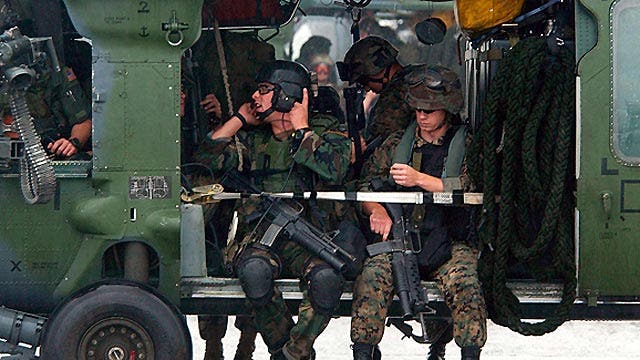The Obama administration's push for airstrikes on Syria has renewed calls from Congress to restore funding to America's military, as lawmakers warn even a limited strike would be hindered by the pounding succession of budget cuts.
As a consequence of budget deals struck between Congress and the White House, the Defense budget is looking at nearly $1 trillion in reductions over the next decade. The sequester is responsible for half that; $487 billion in cuts was already in the works.
While the Pentagon and many members of Congress have fought hard against the sequester cuts, nobody has yet figured out how to undo them. As an end-of-month budget deadline looms, the prospect of strikes in Syria has sharpened focus on the issue.
"The president has left sequestration in place. We have planes being grounded, pilots not receiving training, equipment not being maintained, and yet he wants to go and spend money with the attack against Syria," said Rep. Mike Turner, R-Ohio, a member of the House Armed Services Committee.
A House Armed Services Committee aide told FoxNews.com on Tuesday that the administration would have to seek additional funding or authorization from Congress to pay for a Syria mission. "Administration officials have conceded in the talks about a specific mission that they would have to come to the Hill for some kind of supplemental (budget request)," the aide said. This measure would either be a formal request, subject to a vote, or a request to reprogram existing funds -- which would have to be approved by key committee leaders.
This would make it all the more imperative for President Obama that Congress authorize the strikes in the first place, and all the more difficult for Obama to proceed if Congress doesn't.
The exact price tag for what is being described as a limited strike on the Assad regime is not clear. But in a letter to the Senate Armed Services Committee earlier this year, Chairman of the Joint Chiefs of Staff Gen. Martin Dempsey said "depending on duration, the costs would be in the billions."
If the U.S. mission were to escalate into establishing a no-fly zone, Dempsey wrote that the initial cost would be $500 million, followed by an average price tag of $1 billion every month.
There's also a cost to positioning and preparing for a potential attack. With several destroyers and other vessels moving into the Mediterranean and Red Sea, a senior U.S. military official told Fox News that every day of waiting involves large costs as Navy assets burn through fuel.
"Posturing is expensive," the official told Fox News.
Former Defense Secretary Leon Panetta, who was among the most vocal critics of the sequester cuts when he led the military, revived his budget concerns in a Washington Post column on Tuesday.
"Neither Congress nor the nation can afford to become resigned to failure," he wrote.
Panetta offered a point-by-point catalogue of how the military has been degraded by the cuts, citing prior congressional testimony.
"[F]ewer than half of the Air Force's frontline fighters are combat-ready; 12 combat squadrons have been grounded; key Combat Training Center rotations have been canceled; multiple ship deployments, including the USS Truman carrier strike group, have been canceled; and furloughs for 650,000 civilian employees continue, resulting in a 20 percent pay reduction during every furlough week," he wrote.
"These and other effects of sequestration are weakening the United States' ability to respond effectively to a major crisis in the world beyond the war zone in Afghanistan."
Rep. Buck McKeon, R-Calif., chairman of the House Armed Services Committee, told Fox News that with a potential attack on Syria looming, "We're asking them to do more with less."
McKeon told CNN on Monday that "we cannot keep asking the military to perform mission after mission with sequestration and military cuts hanging over their heads."
Yet some in Congress, in both parties, think Washington has not yet cut deeply enough into the military as the federal government tries to trim deficits and ultimately grapple with its nearly $17 trillion debt.
Sen. Rand Paul, R-Texas, is among those who argue that the Defense Department has not cut enough, and that examples of wasteful spending are still emerging, showing there is still room to reduce the budget.
Some lawmakers, like Senate Majority Leader Harry Reid, D-Nev., have advocated replacing or delaying the sequester by using supposed savings from the wind-down of the Afghanistan and Iraq wars. But critics of that approach have argued that the savings do not exist, coming from money that has not yet been allocated.
FoxNews.com's Judson Berger and Fox News' Jennifer Griffin contributed to this report.





